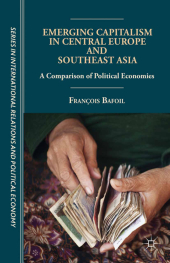 Neuerscheinungen 2014Stand: 2020-02-01 |
Schnellsuche
ISBN/Stichwort/Autor
|
Herderstraße 10
10625 Berlin
Tel.: 030 315 714 16
Fax 030 315 714 14
info@buchspektrum.de |

F. Bafoil
Emerging Capitalism in Central Europe and Southeast Asia
A Comparison of Political Economies
1st ed. 2014. 2014. x, 242 S. 216 mm
Verlag/Jahr: SPRINGER PALGRAVE MACMILLAN; PALGRAVE MACMILLAN US 2014
ISBN: 1-349-48032-0 (1349480320)
Neue ISBN: 978-1-349-48032-6 (9781349480326)
Preis und Lieferzeit: Bitte klicken
This book examines the emergence of different forms of capitalism in Central-Eastern states in Europe and Mekong states within the Association of Southeast Asian Nations (ASEAN). All of them (but Thailand) have historically disappeared from the regional maps for long periods of time due to colonial or imperial rule. Most of them were previously members of a soviet-type economy, and they all joined ASEAN or the European Union in the 1990s or in the 2000s. These states are characterized by a strong urge toward feelings of national sovereignty due to their experiences with colonialism and imperialism. But, due to the regional economic pressures and the globalization dynamic, these states cannot articulate protectionist policies. They are forced to open their economies in order to attract Foreign Direct Investments. This results in less regulated and more political forms of capitalism than in some more developed capitalist countries. This book analyzes forms of capitalism as the arising from a combination of three conditions: the legacy of the foreign occupations, the national construction process of the sovereign state, and lastly, the dynamics of regional integration. These states´ claims to national sovereignty and the manner in which they developed suggests a causative link between the forms of political domination that have presided over these transformations and the forms of capitalism that have resulted.
Introduction: National sovereignty: Economic Markets and Legal Systems The Objects of Comparison 1. What is an ´Under-Developed´ State in Historical Terms? Groups of Countries in Eastern Europe and Southeast Asia The Historical Consequences of Underdevelopment 2. Political Capitalism and Market Economies Are the Different Systems of Legal Rule Complementary or Incompatible? Personal Rule, Rule by Law, and Rule of Law Two Categories of Capitalism: Political versus Market Conclusion 3. Patterns of Development in Southeast Asia The Transformation of the Japanese Evolutionist Model The Developmental State The Developmental Regionalism The Under-Developed Status of Mekong Delta Countries The Geopolitics of Foreign Investment Conclusion 4. State Liberalism and Market Socialism: A Comparison between Singapore and Vietnam Nomenklatura Capitalism Singapore Vietnam Conclusion 5. Cambodia: Political Capitalism and the Prebendal State The ´Hun Sen System´ - The Power of Prebends Special Economic Zones Conclusion: The End of Developmentalism 6. The Improbable German Model: Lessons from German Social and Economic Reunification The Violence of Money: Full Conversion to the Deutschmark, July 1, 1990 The Impossible Transfer East German Dependency Conclusion 7. Industrial Companies and Territories: The Reform Process in Central and Eastern Europe A Non-political Vision of Economic Policy Weak Collective Action Industrial Policy Conclusion 8. Growing Capitalism: The Waves of Expansion in the EU and ASEAN Why Did the EU and ASEAN Expand? Deepening Divides The EU and Central and Eastern European countries: Top-down Deregulatory Pressures Strengthening the Political Personality of ´Smaller´ States: The Limitations of Hegemony. Conclusion: Hybrid Forms of Dependent Capitalism ?
Head of research at the CNRS, France


